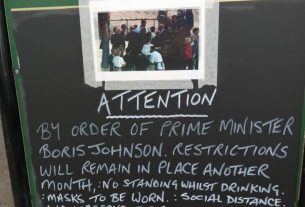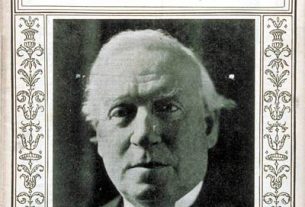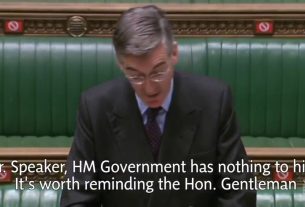Billed by Rishi Sunak as “the most significant thing to ever happen in the NHS”, the long-awaited NHS long term plan aims to fix staffing issues to future proof the health service.
Sunak has allocated £2.4 billion over five years to deliver the “largest expansion in training and workforce” in the 75 year history of the NHS. It works out as less than £500 million per year. It’s hard not to picture the big red Brexit bus with the £350 million per week – amounting to £18.2 billion per year – to spend on the NHS. Whatever happened to that?
In a video posted on Twitter, the PM reminded viewers he comes from an NHS family – his dad being a GP and “my mum working in our local pharmacy.”
“There’s no debate about it. There wouldn’t be an NHS without the staff,” said Sunak.
While there’s no arguing with that logic, you can comment on its vacuousness. It’s like saying there wouldn’t be an army without soldiers – a point made just yesterday by General Sir Patrick Sanders who announced his controversial early departure as head of the British army in a row over troop cuts and equipment.
Commenting on that, Conservative MP Tobias Ellwood, chair of the defence select committee, said: “At the heart of this row is the state of our Armed Forces. Our army is dangerously too small given the growing threats we now face.”
Ellwood could have easily been talking about the NHS which has its own “growing threats” after 13 years of mismanagement and what Stephen Fry calls “covert privatisation” by Conservative governments.
While the army is being scaled back to just 72,500 troops, the NHS, the PM promised, will be boosted by the recruitment of some 300,000 staff over the next 15 years.
It’s taken six years to draw up the plan. Had they managed to do so six months earlier, steps could have been taken to start the education and training elements so crucial to its success this September.
Instead a further 12 months will be wasted.
But the clue is in the name. It’s the NHS Long Term Plan after all. It’s a 15 year staffing strategy so what’s another year in the long scheme of things?
Except this is about health where speed of diagnosis and access to treatment really is a matter of life and death.
Sunak’s bold claim is that this is the “most ambitious transformation in the way we staff the NHS in its history”. It will “protect the long-term future of the NHS and this country”, he claims, by adapting to the increased strain of an ageing population on the health service with the number of over-85s expected to grow by 55% by 2037.
The government reminds at every opportunity that “there are record numbers of doctors and nurses working in the NHS” already, with 5,400 more doctors than a year ago and the government set to reach its five year target of 50,000 more nurses.
Yet, as Rob Hastings writes in the i, “the problem just keeps getting worse.”
A&E units recorded their worst ever May just a few weeks ago while pressures on GPs mount and waiting lists for surgery get longer. Despite the extra recruitment there remain 112,000 vacancies in the NHS and this is forecast to be 360,000 by 2037 without a huge and fundamental shift in recruitment.
The long term plan targets three areas to fill the gap – training, retention and reform. It sets to double the number of places in medical schools from 7,500 to 15,000 by 2031 and increase dentistry training by 40% to provide more than 1,100 annual places. Nursing training places will grow, apprenticeships introduced and medical degrees might be cut from five to four years
Training Brits to be doctors and dentists aims to reduce the reliance on international recruitment from the current level of almost one-in-four staff to around one-in-ten of the workforce.
The government hopes a mix of pension reforms and “culture change” over bullying and overworking will help keep 130,000 more staff over the 15 years.
It’s hoped this will also help cut the bill paid to agencies for temporary staff cover by some £10 billion.
A striking omission from the NHS long term plan is any move to retain staff by paying them more. More so given how strikes over pay have impacted the NHS, patients and staff retention numbers. RCN nurses may have ended their strike but junior doctors are ramping up theirs and will be followed by senior consultants later this month.
NHS 75th birthday bash with Zog and the Flying Doctors
Members of the royal family will join politicians, celebrities, charity workers and public sector workers at Westminster Hall on Wednesday (July 5) “to celebrate the NHS 75th birthday”. Actor Tom Hardy will read Zog and the Flying Doctors on CBeebies Bedtime Stories on the night while the Royal Mint has issued a special 50p coin. A special birthday logo will also be applied to all stamped post sent between July 1 and 4.
People are being encouraged to take part in and support other events marking the 75th anniversary including their local parkrun on July 8 (or July 9 for juniors) and the lighting up of over 150 landmark sites across the country in NHS blue, including the London Eye, Wembley Stadium, Blackpool Tower, Salisbury Cathedral and Liverpool’s Liver Building.
Organisers hope it will be more successful than the Festival of Brexit which was rebranded ‘Unboxed: Creativity in the UK’ and cost tax payers £120 million. It was such a disaster that the National Audit Office is investigating how it managed to splurge so much money on a project that attracted a paltry per cent of its targeted 66 million visitors.




